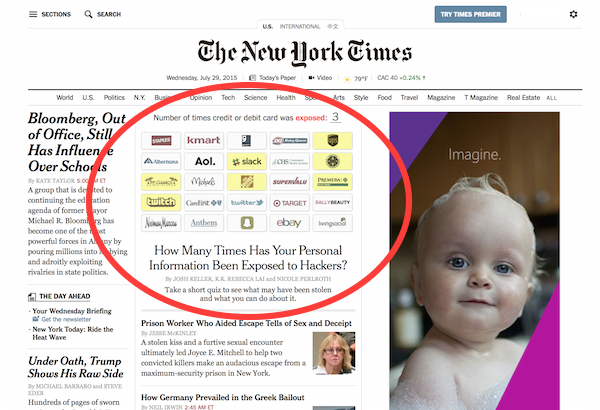Forgive me, I was going to title this post something more subtle like, “Social media’s sin of omission,” but as a blogger shamelessly vying for your attention, I find myself succumbing to the very social media marketing arms race of “say what?!” that I want to push back on.
I know, as a marketer, it’s politically incorrect to be anything less than doe-eyed ga-ga about the Wonder Bread that is social media. And to a certain degree that’s justified. Social media has given customers more power, visibility, and voice — all great things! — which has helped many good and deserving companies gain recognition and caused many not-so-good companies to squirm like worms on the YouTube hook.
However, every now and again — and with greater frequency as of late — social media advocates take a ride on the Hyperbole Train to Sillyville and suggest that businesses should only use social media to build their market. The rallying cry is that push marketing such as advertising is dead — or at least badly wounded and limping to the nearest bar — while pull marketing, such as organic search engine optimization (SEO) and social network interactions on Facebook and Twitter, is now the reigning champion of the marketing world.
Frankly, that’s like expecting your old college roommate — who once helped you schlep two duffle bags into your 8×12 closet of a dorm room — to come over and now move your family of eight from New York to California. For free. Including grandma’s antique grand piano and those big pots on the patio.
Marketers who cede the heavy lifting entirely to the crowd cloud, do so at the risk of not moving at all.
I can prove it mathematically.
But first, just so I don’t have my marketing license revoked — or have someone bludgeon me with a hardcover copy of Chris Brogan’s Trust Agents — let me reaffirm that there are plenty of things that social media is spectacular at:
- an incredible feedback mechanism to hear from prospects and customers;
- a bonding mechanism to build better relationships with people across distance;
- a delivery mechanism for useful or entertaining content to your fans;
- a force multiplier mechanism to boost successful products and marketing;
- a social enforcement mechanism to encourage your firm to do the right thing;
These are all solid reasons for a marketer to love social media.
However, what I don’t think social media is particularly reliable for is getting the word out for new products or services, especially for small to medium sized organizations.
This was going to be the “sin of omission” that I originally envisioned for this post. Social media marketing advocates share two kinds of anecdotes: those of good companies who were rewarded for their fine participation in social media and those of bad companies who were punished for failure to respect the social Blitzkrieg.
What is omitted are the stories of good companies, who genuinely embrace social media, openly sharing good stuff with the community, warmly engaging with anyone who saunters into their social network… yet who get very little return from their endeavors.
And, just to clarify, by “good companies” I mean organizations that include remarkable people and products. They’re doing legitimately great things to make the world a better place, and they’re happy to blog and tweet about it, commenting and friending in every relevant venue. They’re good social media citizens.
Yet still it’s hard to move the needle.
See, for every Gary Vaynerchuk who’s crushing it, God bless him, there are hundreds or thousands of others who are walking the walk, but on more of a treadmill than a victory lap. Maybe that’s because Gary is way better than most. Or maybe he caught a wave at the right time in the right place. Or both. Either way, I have high regard for the guy.
I just don’t think “be like Gary Vaynerchuk” is a practical marketing plan.
The problem is the math (isn’t it always?). As more and more people invest their energy into contributing to the social sphere, the social sphere gets noisier and noisier. It’s like the East Village on a Saturday night, multiplied by a million. While people’s abilities to produce content has exploded, our ability to consume content, in any way that’s truly meaningful, is still quite limited. The cacophony of choice is a dizzying wall of sound.
Cutting through that pandemonium — even with a remarkable product or service — requires one or more of the following:
- a Looooooong Tail focus on very specific niches;
- ever more ridiculously provocative ideas and hooks;
- an incredible stroke of luck and/or sheer genius;
- judicious use of “other” marketing than social media;
The Long Tail is wonderful, but the farther out you go, the harder it is to achieve scale. Ridiculously provocative ideas are a vicious cycle, as each needs to be more outrageous than the last to stand out, and they can have undesirable side effects — such as now my blog is going to show up for lunatics searching for “ravaged cattle.” Great, there’s a niche. As for incredible strokes of luck, play the lottery. But as a professional marketer, more predictable work is required.
The “other” kind of marketing — advertising, email, conferences and events, channel promotions, sponsorships, and PR via more exclusive channels — is the only reliable and scalable option.
Don’t take my word for it, though. As social media advocates are fond of emphasizing that actions speak louder than words, look at how social media thought leaders themselves — and vendors selling products in that space — promote their own brands:
- speaking at, sponsoring, and organizing conferences about social media (i.e., event marketing);
- traditional publishing of books promoted in bookstores and on Amazon.com;
- advertising said books and conferences on popular sites and search engines;
- collecting email addresses and engaging in permission marketing and marketing automation (more vendors than individuals);
- having one-to-one discussions with people to win business (i.e., sales);
I don’t think that’s hypocritical — that’s exactly what they should be doing. Okay, maybe a tad hypocritical for those who have declared “other” marketing dead, but then again, here I am taking a swipe at social media through a blog post that I’m hoping will be indexed, tweeted, bookmarked, and dugg. (Kind of a weird existential loop. If only Descartes were alive to proclaim, “I blog, therefore I am” — or Blogito, ergo sum in the original Latin.)
My point is that social media marketing is not the destructor of “other” marketing.
To the contrary, social media marketing is immensely synergistic with other marketing vehicles — so long as the marketer is genuine and the company is good. I think some of the most exciting innovation in marketing is the integration of social media tactics and channels into other vehicles such as advertising, billboards, email nurturing, and the ever-imminent blossom of mobile marketing.
Every organization should embrace social media marketing for what it is — which is great — without falling for unrealistic myths of it as a silver bullet. It’s a necessary, but not sufficient, component of sustainable success in the new marketing world.
Everything in perspective.



